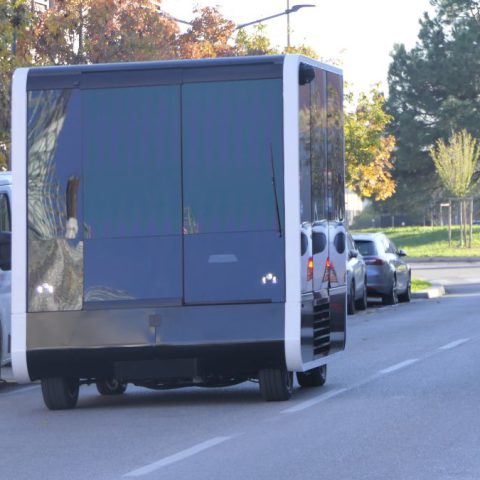The Italian startup aiming to revolutionize passenger mobility through modularity. Next pods are ready for on-demand transport projects
Around 10 vehicles today involved in pilot projects. 50 vehicles will start roll out of production lines in 2024 headed to the European and Middle East market. And discussions are in progress for partnerships with industrial players that might help the startup to scale up larger volumes. We just had the opportunity to meet with […]

Around 10 vehicles today involved in pilot projects. 50 vehicles will start roll out of production lines in 2024 headed to the European and Middle East market. And discussions are in progress for partnerships with industrial players that might help the startup to scale up larger volumes.
We just had the opportunity to meet with the team of the innovative Italian company Next Modular Vehicles and experience their NX23 pod during a journey through the streets of Milan.
And in Milan the company is expected to launch a pioneering project with the city’s public transport agency AMAT in late 2024 – early 2025, as they won a European project. “AMAT will be deploying our vehicles within a brand new on-demand service. People will be able to call for a vehicle through mobile app. Pods will be bundled together according to service needs, and passengers will see on the mobile in case they have to move to another pod in order to reach their destination”, says Next founder Tommaso Gecchelin, backed by CCO Domenico Giudici, Chief Engineer Edoardo Fantin and Senior Automotive Advisor Giacomo Marra.

Next Modular Vehicles’ pods on the global markets
The company operates globally with a facility in Padua, in Veneto region, north West of Italy, and another in Dubai. A significant milestone was reached in mid-2023 with an investment agreement from Paradigma Management Consultancies LLC, injecting €2.5 million into Next Modular Vehicles.
Next-made pods can operate as a single ‘wagon’ or connect to other modules based on real-time transport demand. During peak hours, the vehicle can seamlessly connects multiple pods, accommodating increased demand, akin to an 18-meter bus or tram. During off-peak times, the configuration may adjust to a lighter setup (the solo NX23 pod has a length of 3,676mm), optimizing energy use and planning for future demand.

“The European homologation of the new model NX23 is underway – Gecchelin explains -. However, the other pod module we have already been trialling in Padua passed homologation testing for M1 IVA”.
“The company is composed by around 15 people – still Gecchelin -. The headquarter is in Padua doing R&D and prototype production, another assembly facility is in Dubai where we are actively collaborating with the transportation agency RTA since 2016. Scaling up to larger volumes, over 500 units yearly, will require the cooperation of an industrial partner, and we are working on this, as we are already in discussion with a prominent Italian bus maker“.
Targeted markets? “At the moment is that of VIP services, resorts, touristic destinations. We are gathering some interest also from the airport sector, where the vehicles might be deployed for connection between parking lots and terminal”.
Also good transport applications in Next spotlight
Looking ahead, “In 2026 we expect to begin with operating public service with dynamically connecting and disconnecting pods. The core value of Next is indeed the fact that many pods (up to 5) can be bundled together mechanically (while the alligment of pods is allowed by a proprietary IT robotic system). When docked together, up to 3 pods create a single vehicle with no articulation. When over 3 pods are connected, then the vehicles become selectively articulated. People can move from one pod to the other through the front and back door of each pod”.

But not only passenger transportation is in the spotlight. Applications in the goods transportation market, particularly in the last mile services, are also in sight. Let’s still hear from Gecchelin: “Another possible application is the connection between a first pod used for passenger transport and a second pod used for goods transportation. In Padua we are about to launch a dynamic-lockers-pods project within a European tender we won. Pods will be used for goods delivery. In case some boxes won’t be delivered, they’ll be stored in a pod that will be parked in a strategic place, and recipients of the boxes will of course be informed of the localization of the locker in order to collect their parcels”.
And another project in starting soon: “In summer 2024 we’ll be also starting a new project in the touristic destination of Courmayeur, in the Alps, through a partnership with the city council and the operator Arriva“.







